Development of psychosocial skills in children
VerifiedAdded on 2022/11/17
|6
|1727
|80
AI Summary
This essay discusses the critical aspects of psychosocial development that occur in children between the ages of two and five years, and what influences this development. It also talks about the toilet training process and how it affects the child's autonomy.
Contribute Materials
Your contribution can guide someone’s learning journey. Share your
documents today.
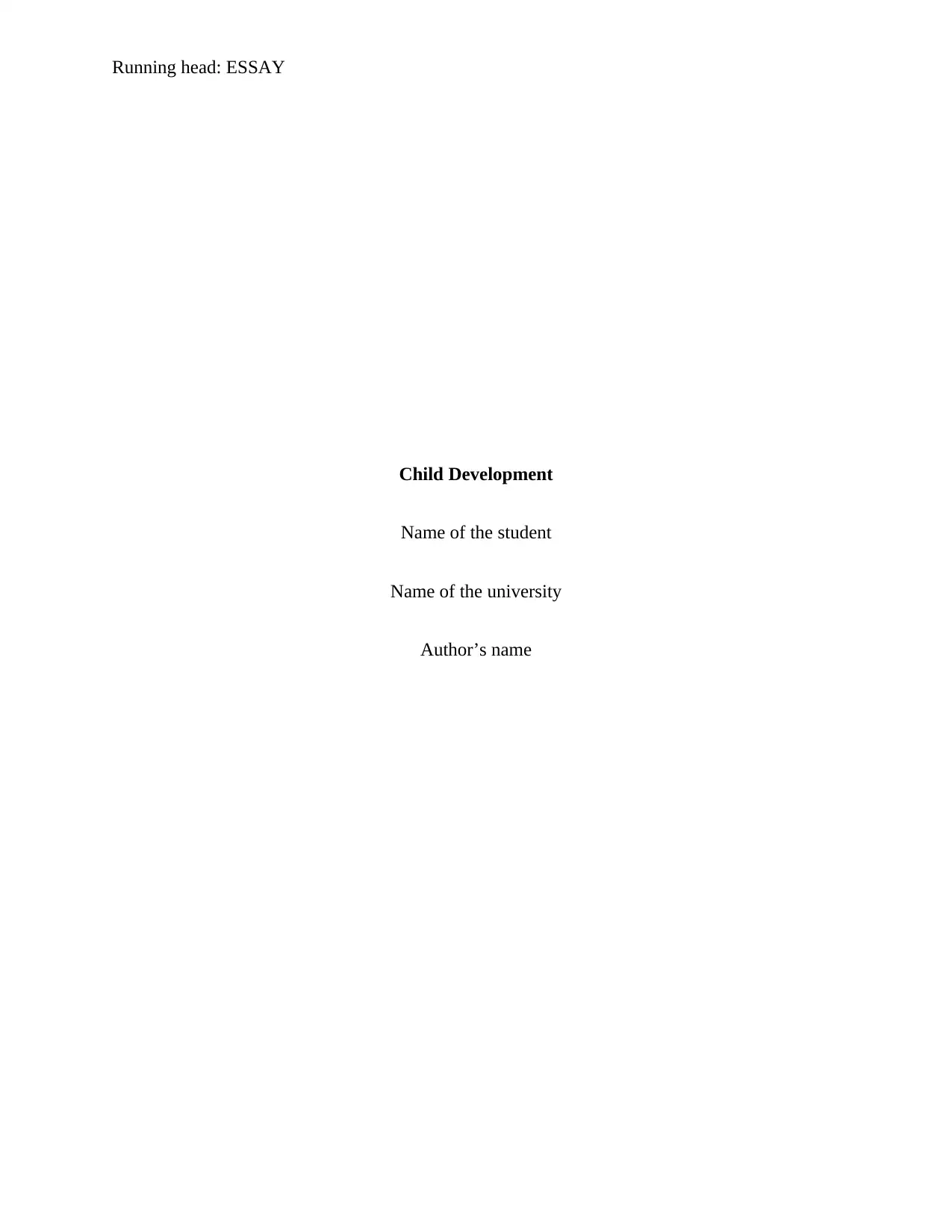
Running head: ESSAY
Child Development
Name of the student
Name of the university
Author’s name
Child Development
Name of the student
Name of the university
Author’s name
Secure Best Marks with AI Grader
Need help grading? Try our AI Grader for instant feedback on your assignments.
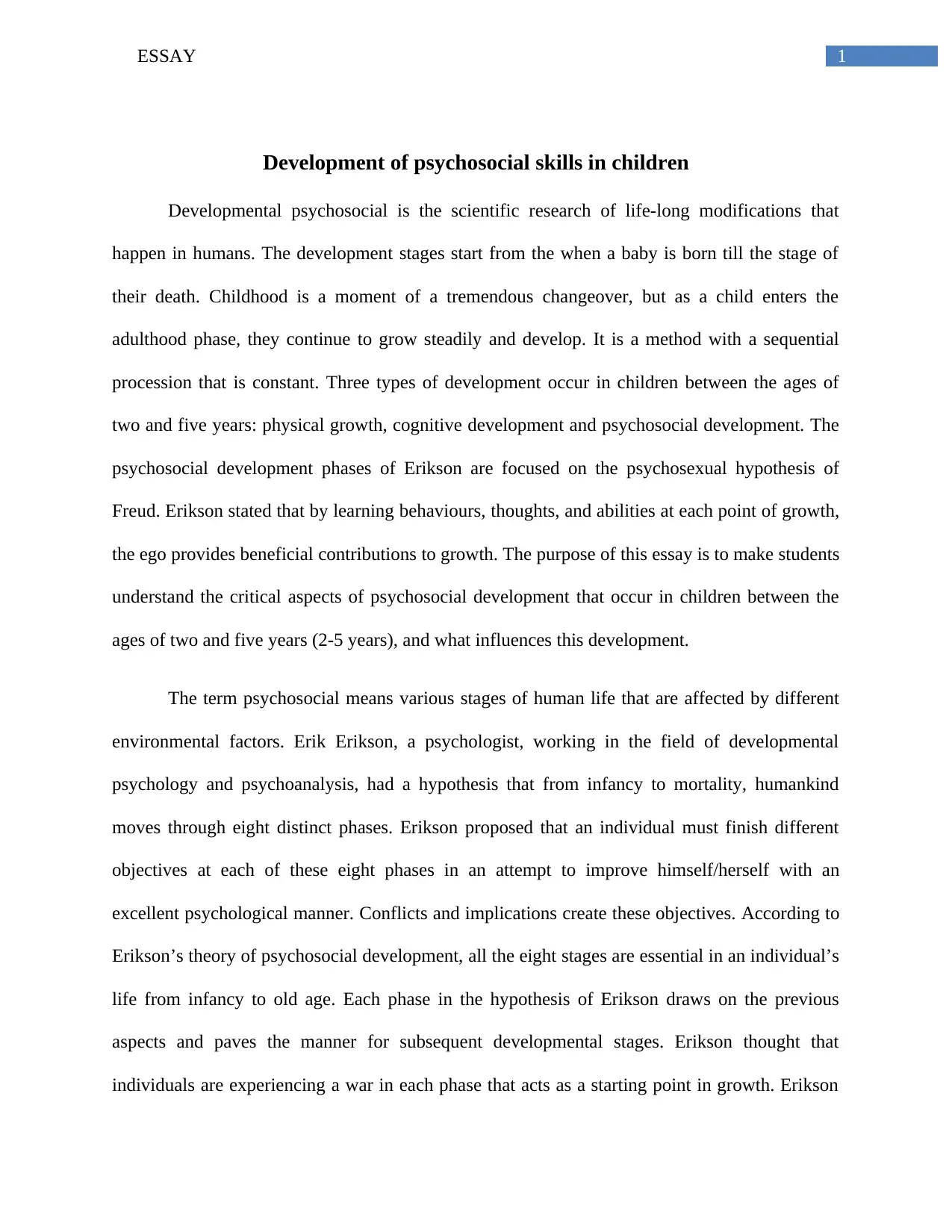
1ESSAY
Development of psychosocial skills in children
Developmental psychosocial is the scientific research of life-long modifications that
happen in humans. The development stages start from the when a baby is born till the stage of
their death. Childhood is a moment of a tremendous changeover, but as a child enters the
adulthood phase, they continue to grow steadily and develop. It is a method with a sequential
procession that is constant. Three types of development occur in children between the ages of
two and five years: physical growth, cognitive development and psychosocial development. The
psychosocial development phases of Erikson are focused on the psychosexual hypothesis of
Freud. Erikson stated that by learning behaviours, thoughts, and abilities at each point of growth,
the ego provides beneficial contributions to growth. The purpose of this essay is to make students
understand the critical aspects of psychosocial development that occur in children between the
ages of two and five years (2-5 years), and what influences this development.
The term psychosocial means various stages of human life that are affected by different
environmental factors. Erik Erikson, a psychologist, working in the field of developmental
psychology and psychoanalysis, had a hypothesis that from infancy to mortality, humankind
moves through eight distinct phases. Erikson proposed that an individual must finish different
objectives at each of these eight phases in an attempt to improve himself/herself with an
excellent psychological manner. Conflicts and implications create these objectives. According to
Erikson’s theory of psychosocial development, all the eight stages are essential in an individual’s
life from infancy to old age. Each phase in the hypothesis of Erikson draws on the previous
aspects and paves the manner for subsequent developmental stages. Erikson thought that
individuals are experiencing a war in each phase that acts as a starting point in growth. Erikson
Development of psychosocial skills in children
Developmental psychosocial is the scientific research of life-long modifications that
happen in humans. The development stages start from the when a baby is born till the stage of
their death. Childhood is a moment of a tremendous changeover, but as a child enters the
adulthood phase, they continue to grow steadily and develop. It is a method with a sequential
procession that is constant. Three types of development occur in children between the ages of
two and five years: physical growth, cognitive development and psychosocial development. The
psychosocial development phases of Erikson are focused on the psychosexual hypothesis of
Freud. Erikson stated that by learning behaviours, thoughts, and abilities at each point of growth,
the ego provides beneficial contributions to growth. The purpose of this essay is to make students
understand the critical aspects of psychosocial development that occur in children between the
ages of two and five years (2-5 years), and what influences this development.
The term psychosocial means various stages of human life that are affected by different
environmental factors. Erik Erikson, a psychologist, working in the field of developmental
psychology and psychoanalysis, had a hypothesis that from infancy to mortality, humankind
moves through eight distinct phases. Erikson proposed that an individual must finish different
objectives at each of these eight phases in an attempt to improve himself/herself with an
excellent psychological manner. Conflicts and implications create these objectives. According to
Erikson’s theory of psychosocial development, all the eight stages are essential in an individual’s
life from infancy to old age. Each phase in the hypothesis of Erikson draws on the previous
aspects and paves the manner for subsequent developmental stages. Erikson thought that
individuals are experiencing a war in each phase that acts as a starting point in growth. Erikson

2ESSAY
also believed that a feeling of authority motivates attitudes and behaviour. Each stage in
Erikson’s hypothesis is about competence in a lifestyle region. The individual will experience a
sense of mastery if the phase is treated well, which is sometimes referred to as ego power or ego
value. If the stage is poorly controlled, the individual will arise in that part of growth with a
feeling of inadequacy. According to the case study, it is seen that Andrew is a 2.5 year age kid.
According to the Child and Family Health Nurse Andrew is meeting all his developmental
milestones properly and will be more competent as he grows up though it is seen that toilet
training is an issue for Andrew. Also, it was observed that Andrew was able to communicate in
four or five words through which he could express his needs. This helped his parents Maria and
Tom understand the needs of Andrew, and that helped in fulfilling the requirements.
Toilet training is a step in the development and a task for families and kids. It’s one of the
child’s first stages in becoming self-sufficient. Eventually, all kids will begin to obtain the
required learning, but the challenge engaged is a significant problem for families and creates
household disputes (Azrin& Foxx, 2019). Toilet training is affected by variables such as
physiology, psychology and socio-culture. It is the duty of a parent or the childcare members to
train the kid for toilet training to help the child in building their autonomy. There are specific
steps which if taken, can help the child receive proper toilet training and receive as they grow.
Many parents are uncertain when to begin teaching in the toilet.
Not all children are fully prepared around the same age, so watching the kid for
indications of urgency, like halting an activity for a couple of seconds or holding his or her
diaper, is essential (Azrin& Foxx, 2019). A child can be taught for toilet training when the child
has stopped working on something and shows an indication that he/she wants to visit the toilet.
The parent must guide their child to remove their clothes and go to the bathroom. If they’re
also believed that a feeling of authority motivates attitudes and behaviour. Each stage in
Erikson’s hypothesis is about competence in a lifestyle region. The individual will experience a
sense of mastery if the phase is treated well, which is sometimes referred to as ego power or ego
value. If the stage is poorly controlled, the individual will arise in that part of growth with a
feeling of inadequacy. According to the case study, it is seen that Andrew is a 2.5 year age kid.
According to the Child and Family Health Nurse Andrew is meeting all his developmental
milestones properly and will be more competent as he grows up though it is seen that toilet
training is an issue for Andrew. Also, it was observed that Andrew was able to communicate in
four or five words through which he could express his needs. This helped his parents Maria and
Tom understand the needs of Andrew, and that helped in fulfilling the requirements.
Toilet training is a step in the development and a task for families and kids. It’s one of the
child’s first stages in becoming self-sufficient. Eventually, all kids will begin to obtain the
required learning, but the challenge engaged is a significant problem for families and creates
household disputes (Azrin& Foxx, 2019). Toilet training is affected by variables such as
physiology, psychology and socio-culture. It is the duty of a parent or the childcare members to
train the kid for toilet training to help the child in building their autonomy. There are specific
steps which if taken, can help the child receive proper toilet training and receive as they grow.
Many parents are uncertain when to begin teaching in the toilet.
Not all children are fully prepared around the same age, so watching the kid for
indications of urgency, like halting an activity for a couple of seconds or holding his or her
diaper, is essential (Azrin& Foxx, 2019). A child can be taught for toilet training when the child
has stopped working on something and shows an indication that he/she wants to visit the toilet.
The parent must guide their child to remove their clothes and go to the bathroom. If they’re
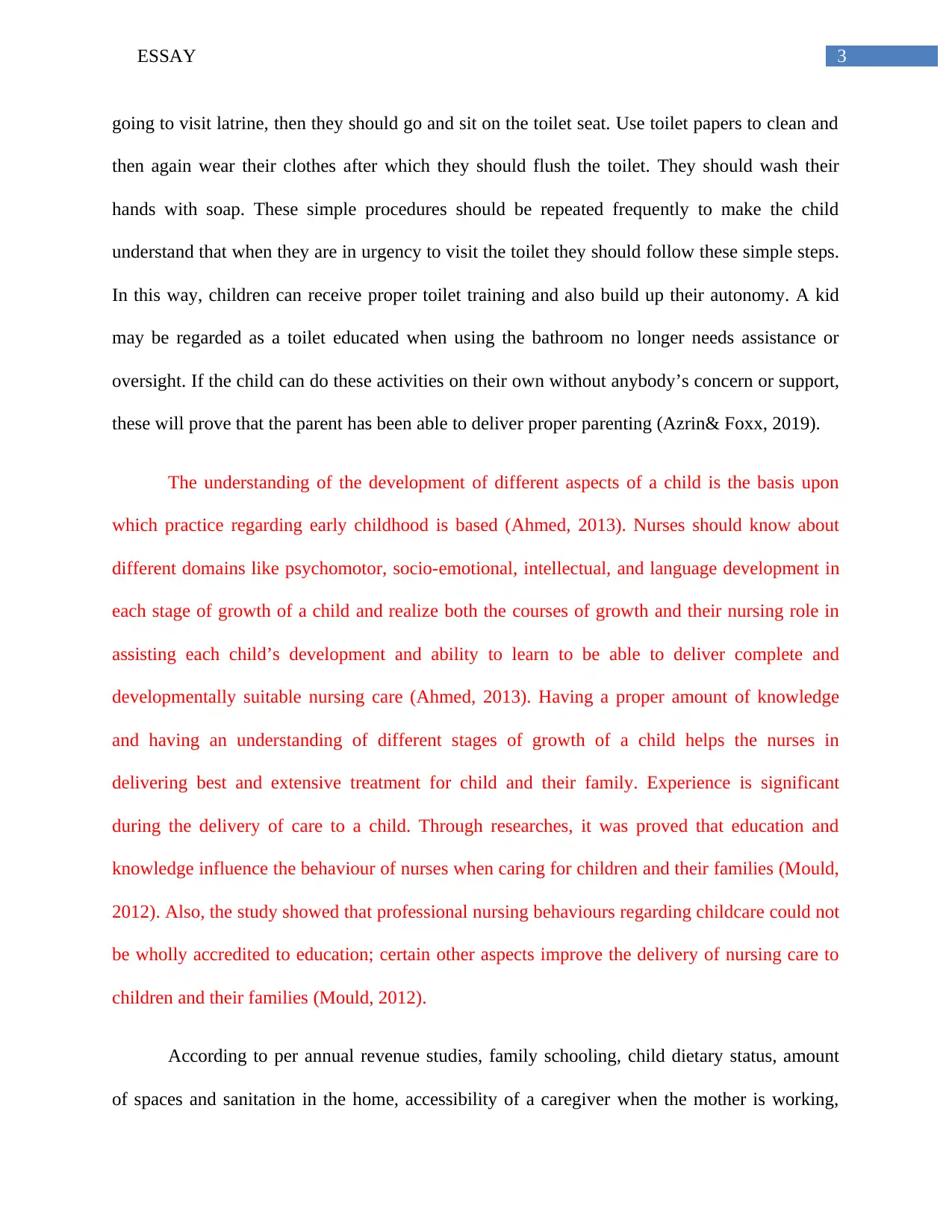
3ESSAY
going to visit latrine, then they should go and sit on the toilet seat. Use toilet papers to clean and
then again wear their clothes after which they should flush the toilet. They should wash their
hands with soap. These simple procedures should be repeated frequently to make the child
understand that when they are in urgency to visit the toilet they should follow these simple steps.
In this way, children can receive proper toilet training and also build up their autonomy. A kid
may be regarded as a toilet educated when using the bathroom no longer needs assistance or
oversight. If the child can do these activities on their own without anybody’s concern or support,
these will prove that the parent has been able to deliver proper parenting (Azrin& Foxx, 2019).
The understanding of the development of different aspects of a child is the basis upon
which practice regarding early childhood is based (Ahmed, 2013). Nurses should know about
different domains like psychomotor, socio-emotional, intellectual, and language development in
each stage of growth of a child and realize both the courses of growth and their nursing role in
assisting each child’s development and ability to learn to be able to deliver complete and
developmentally suitable nursing care (Ahmed, 2013). Having a proper amount of knowledge
and having an understanding of different stages of growth of a child helps the nurses in
delivering best and extensive treatment for child and their family. Experience is significant
during the delivery of care to a child. Through researches, it was proved that education and
knowledge influence the behaviour of nurses when caring for children and their families (Mould,
2012). Also, the study showed that professional nursing behaviours regarding childcare could not
be wholly accredited to education; certain other aspects improve the delivery of nursing care to
children and their families (Mould, 2012).
According to per annual revenue studies, family schooling, child dietary status, amount
of spaces and sanitation in the home, accessibility of a caregiver when the mother is working,
going to visit latrine, then they should go and sit on the toilet seat. Use toilet papers to clean and
then again wear their clothes after which they should flush the toilet. They should wash their
hands with soap. These simple procedures should be repeated frequently to make the child
understand that when they are in urgency to visit the toilet they should follow these simple steps.
In this way, children can receive proper toilet training and also build up their autonomy. A kid
may be regarded as a toilet educated when using the bathroom no longer needs assistance or
oversight. If the child can do these activities on their own without anybody’s concern or support,
these will prove that the parent has been able to deliver proper parenting (Azrin& Foxx, 2019).
The understanding of the development of different aspects of a child is the basis upon
which practice regarding early childhood is based (Ahmed, 2013). Nurses should know about
different domains like psychomotor, socio-emotional, intellectual, and language development in
each stage of growth of a child and realize both the courses of growth and their nursing role in
assisting each child’s development and ability to learn to be able to deliver complete and
developmentally suitable nursing care (Ahmed, 2013). Having a proper amount of knowledge
and having an understanding of different stages of growth of a child helps the nurses in
delivering best and extensive treatment for child and their family. Experience is significant
during the delivery of care to a child. Through researches, it was proved that education and
knowledge influence the behaviour of nurses when caring for children and their families (Mould,
2012). Also, the study showed that professional nursing behaviours regarding childcare could not
be wholly accredited to education; certain other aspects improve the delivery of nursing care to
children and their families (Mould, 2012).
According to per annual revenue studies, family schooling, child dietary status, amount
of spaces and sanitation in the home, accessibility of a caregiver when the mother is working,
Secure Best Marks with AI Grader
Need help grading? Try our AI Grader for instant feedback on your assignments.
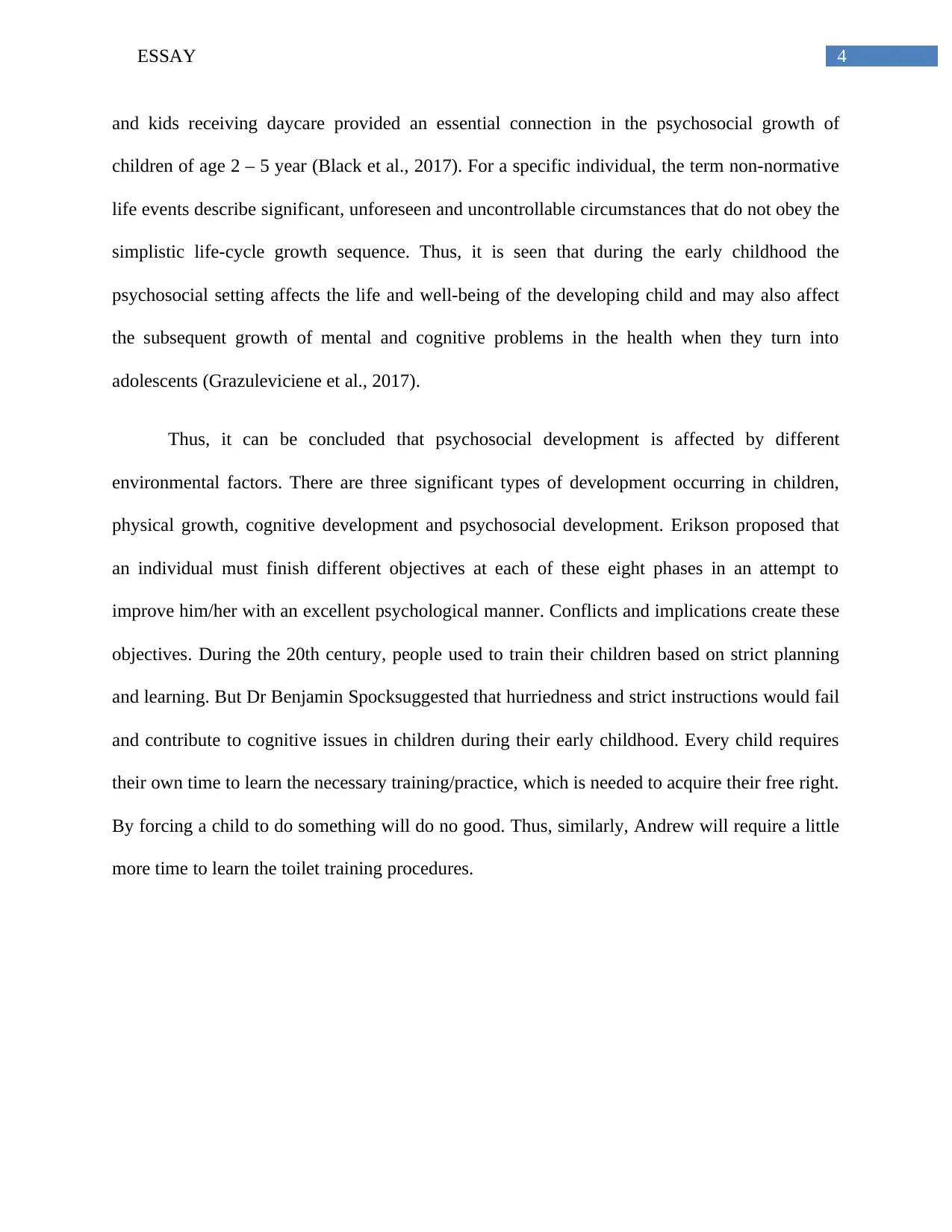
4ESSAY
and kids receiving daycare provided an essential connection in the psychosocial growth of
children of age 2 – 5 year (Black et al., 2017). For a specific individual, the term non-normative
life events describe significant, unforeseen and uncontrollable circumstances that do not obey the
simplistic life-cycle growth sequence. Thus, it is seen that during the early childhood the
psychosocial setting affects the life and well-being of the developing child and may also affect
the subsequent growth of mental and cognitive problems in the health when they turn into
adolescents (Grazuleviciene et al., 2017).
Thus, it can be concluded that psychosocial development is affected by different
environmental factors. There are three significant types of development occurring in children,
physical growth, cognitive development and psychosocial development. Erikson proposed that
an individual must finish different objectives at each of these eight phases in an attempt to
improve him/her with an excellent psychological manner. Conflicts and implications create these
objectives. During the 20th century, people used to train their children based on strict planning
and learning. But Dr Benjamin Spocksuggested that hurriedness and strict instructions would fail
and contribute to cognitive issues in children during their early childhood. Every child requires
their own time to learn the necessary training/practice, which is needed to acquire their free right.
By forcing a child to do something will do no good. Thus, similarly, Andrew will require a little
more time to learn the toilet training procedures.
and kids receiving daycare provided an essential connection in the psychosocial growth of
children of age 2 – 5 year (Black et al., 2017). For a specific individual, the term non-normative
life events describe significant, unforeseen and uncontrollable circumstances that do not obey the
simplistic life-cycle growth sequence. Thus, it is seen that during the early childhood the
psychosocial setting affects the life and well-being of the developing child and may also affect
the subsequent growth of mental and cognitive problems in the health when they turn into
adolescents (Grazuleviciene et al., 2017).
Thus, it can be concluded that psychosocial development is affected by different
environmental factors. There are three significant types of development occurring in children,
physical growth, cognitive development and psychosocial development. Erikson proposed that
an individual must finish different objectives at each of these eight phases in an attempt to
improve him/her with an excellent psychological manner. Conflicts and implications create these
objectives. During the 20th century, people used to train their children based on strict planning
and learning. But Dr Benjamin Spocksuggested that hurriedness and strict instructions would fail
and contribute to cognitive issues in children during their early childhood. Every child requires
their own time to learn the necessary training/practice, which is needed to acquire their free right.
By forcing a child to do something will do no good. Thus, similarly, Andrew will require a little
more time to learn the toilet training procedures.
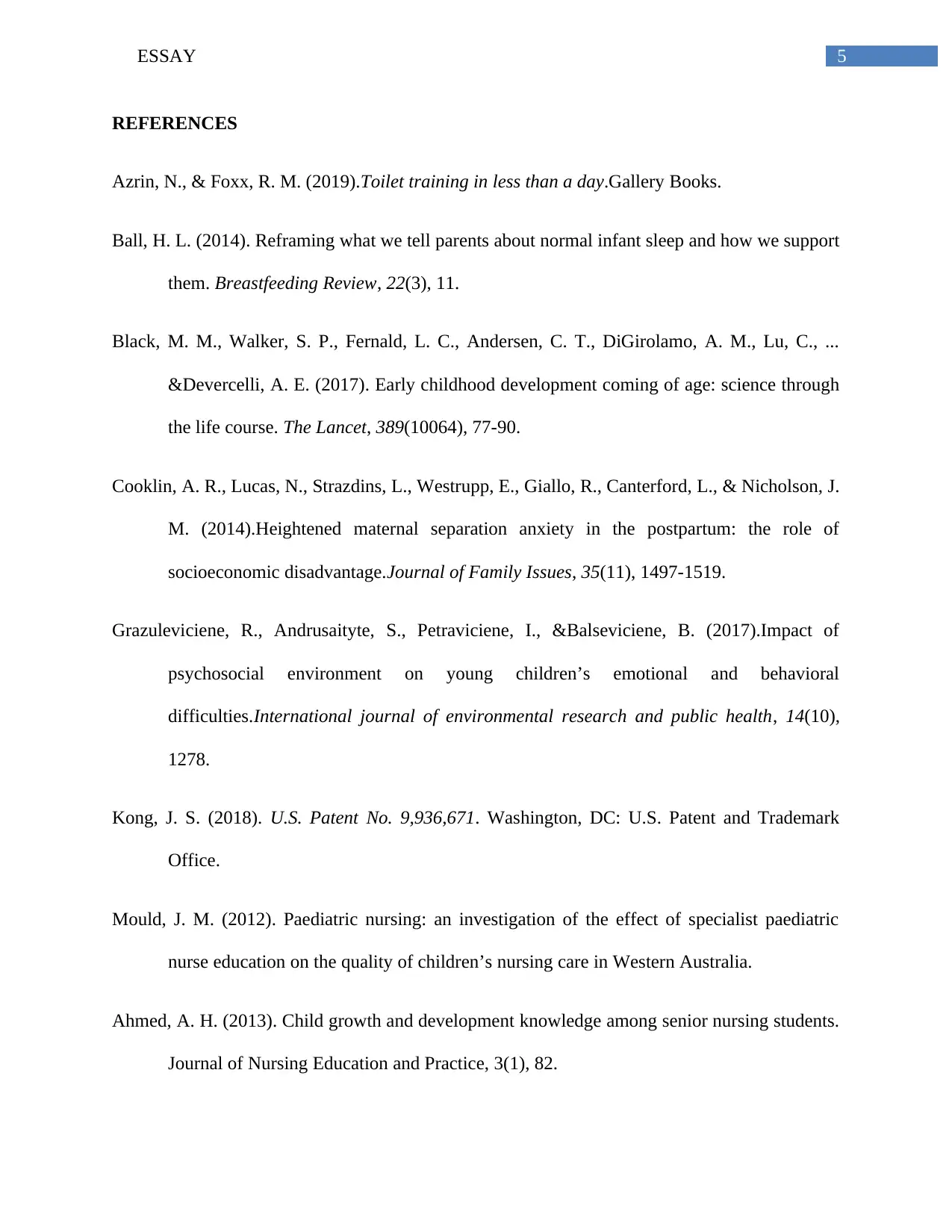
5ESSAY
REFERENCES
Azrin, N., & Foxx, R. M. (2019).Toilet training in less than a day.Gallery Books.
Ball, H. L. (2014). Reframing what we tell parents about normal infant sleep and how we support
them. Breastfeeding Review, 22(3), 11.
Black, M. M., Walker, S. P., Fernald, L. C., Andersen, C. T., DiGirolamo, A. M., Lu, C., ...
&Devercelli, A. E. (2017). Early childhood development coming of age: science through
the life course. The Lancet, 389(10064), 77-90.
Cooklin, A. R., Lucas, N., Strazdins, L., Westrupp, E., Giallo, R., Canterford, L., & Nicholson, J.
M. (2014).Heightened maternal separation anxiety in the postpartum: the role of
socioeconomic disadvantage.Journal of Family Issues, 35(11), 1497-1519.
Grazuleviciene, R., Andrusaityte, S., Petraviciene, I., &Balseviciene, B. (2017).Impact of
psychosocial environment on young children’s emotional and behavioral
difficulties.International journal of environmental research and public health, 14(10),
1278.
Kong, J. S. (2018). U.S. Patent No. 9,936,671. Washington, DC: U.S. Patent and Trademark
Office.
Mould, J. M. (2012). Paediatric nursing: an investigation of the effect of specialist paediatric
nurse education on the quality of children’s nursing care in Western Australia.
Ahmed, A. H. (2013). Child growth and development knowledge among senior nursing students.
Journal of Nursing Education and Practice, 3(1), 82.
REFERENCES
Azrin, N., & Foxx, R. M. (2019).Toilet training in less than a day.Gallery Books.
Ball, H. L. (2014). Reframing what we tell parents about normal infant sleep and how we support
them. Breastfeeding Review, 22(3), 11.
Black, M. M., Walker, S. P., Fernald, L. C., Andersen, C. T., DiGirolamo, A. M., Lu, C., ...
&Devercelli, A. E. (2017). Early childhood development coming of age: science through
the life course. The Lancet, 389(10064), 77-90.
Cooklin, A. R., Lucas, N., Strazdins, L., Westrupp, E., Giallo, R., Canterford, L., & Nicholson, J.
M. (2014).Heightened maternal separation anxiety in the postpartum: the role of
socioeconomic disadvantage.Journal of Family Issues, 35(11), 1497-1519.
Grazuleviciene, R., Andrusaityte, S., Petraviciene, I., &Balseviciene, B. (2017).Impact of
psychosocial environment on young children’s emotional and behavioral
difficulties.International journal of environmental research and public health, 14(10),
1278.
Kong, J. S. (2018). U.S. Patent No. 9,936,671. Washington, DC: U.S. Patent and Trademark
Office.
Mould, J. M. (2012). Paediatric nursing: an investigation of the effect of specialist paediatric
nurse education on the quality of children’s nursing care in Western Australia.
Ahmed, A. H. (2013). Child growth and development knowledge among senior nursing students.
Journal of Nursing Education and Practice, 3(1), 82.
1 out of 6
Related Documents
Your All-in-One AI-Powered Toolkit for Academic Success.
+13062052269
info@desklib.com
Available 24*7 on WhatsApp / Email
![[object Object]](/_next/static/media/star-bottom.7253800d.svg)
Unlock your academic potential
© 2024 | Zucol Services PVT LTD | All rights reserved.





